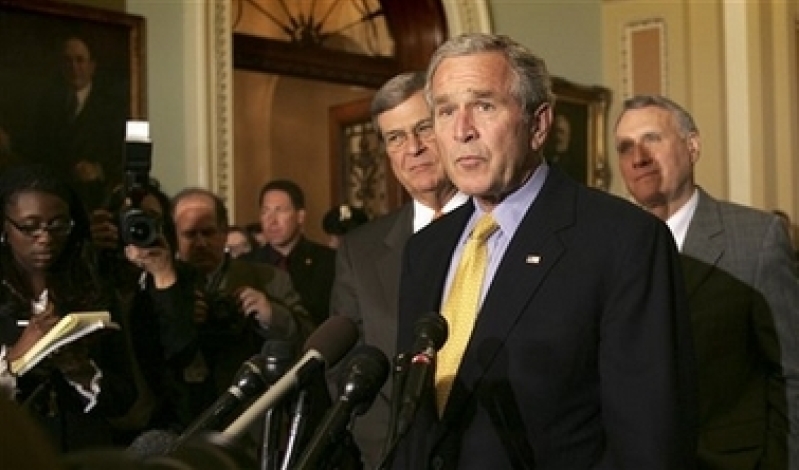
WASHINGTON – A rare presidential visit to the Capitol coupled with an emotional appeal to Republican senators Tuesday may have persuaded some indecisive senators to support the immigration bill.
President Bush attended a Republican luncheon on the first full day back from Europe and spent most of the hour-long meeting talking about immigration, according to USA Today. He repeated the importance of the bill and the need to quickly resolve the status of 12 million illegal immigrants living in the shadows of society.
“This is a highly emotional issue, but those of us standing here believe now is the time to move a comprehensive bill,” Bush said just outside the Senate chamber to reporters.
Besides the president stood three Republican leaders Senate Minority Leader Mitch McConnell (R-Ky.), Sen. Trent Lott (R-Miss.) and Sen. Jon Kyl (R-Ariz.). All three senators had voted against the bill when Senate Majority Leader Harry Reid (D-Nev.) wanted to limit debate and move towards a final vote last week.
“It’s going to take a lot of hard work, a lot of effort,” Bush predicted.
Bush’s presence in the halls of Congress is rare – seeing that most presidents do not often visit Congress – but fades in comparison to his presidential lobby effort on Capitol Hill. This is the president’s first trip to the weekly Senate party luncheon since 2001.
Bush was described by McConnell as “very emotional in describing his feeling about the importance of doing this,” according to USA Today.
“I don’t think there was anybody in the room who was not impressed by the strength of his conviction on this issue,” McConnell added.
However, some Republican senators are still opposed to the bill despite the president’s appeal.
Sen. Jeff Sessions (R-Ala.) said the luncheon meeting did not assuage any of his concerns. Yet he noted that Bush, during a personal exchange, “made it clear he was my friend whether I was with him or not.”
“He made clear that he wasn’t there to threaten anybody or do anything that would be hostile to anybody who disagrees with him,” said Sessions, a leading opponent of the bill, according to New York Times. “He was there to appeal to our sense of commitment to do the right thing.”
The main concern of Republican opponents, who want more emphasis on border security, is that the bill provides amnesty for illegal immigrants.
“I believe without the bill that it’s going to be harder to enforce the border,” said Bush in response after the meeting.
Sen. Lindsey Graham (R–S.C.), a supporter of the plan, said Bush also noted during the luncheon that he may be more committed to making security a strong part of the immigration law than future presidents.
“I think he made a very good point that if we fail to act, others will,” Graham said, according to the New York Times.
Senate Majority Leader Harry Reid (D-Nev.) had already said last week, after pulling the bill from the floor, that he is willing to resume debate on the bill if Bush can deliver more support from Republican senators.
Only seven Republicans voted in favor of ending debate on the bill and moving towards a final vote last Thursday in comparison to 80 percent of Democrats.
Reid had removed the bill from the Senate agenda after the failed cloture motion because he said debate had gone on too long and there are other bills waiting to be discussed.
"We have one good opportunity to pass immigration reform, and it's within the next few weeks in the U.S. Congress,” Kyl pointed out on CNN’s “American Morning.” “I think all of the experts agree that thereafter we get into the presidential/political season. Next year it's not going to be possible."






